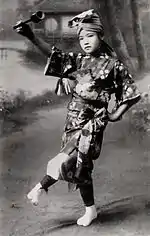List of Intangible Cultural Properties of Japan (Kagoshima)
This list is of the Intangible Cultural Properties of Japan in the Prefecture of Kagoshima.[1]
National Cultural Properties
As of 1 August 2015, zero Important Intangible Cultural Properties have been designated.[2][3][4]
Prefectural Cultural Properties
As of 1 April 2015, three properties have been designated at a prefectural level.[4][5]
Performing Arts
| Property | Holder | Comments | Image | Ref. |
|---|---|---|---|---|
| Satsuma biwa 薩摩琵琶 Satsuma biwa | Satsuma Biwa Appreciation Society (薩摩琵琶同好会) | %252C_Japan_-_MIM_PHX.jpg.webp) | ||
| Myōon jūnigaku 妙音十二楽 myōon jūni-gaku | Myōon Jūnigaku Preservation Society (妙音十二楽保存会) | eight voices, including the biwa, taiko, flute, and hand-clapping, perform a repertoire of twelve pieces including Wind in the pines (松風) and Village rain (村雨); with its origin in temple music, performances take place in the Jōraku-in (中島常楽院) in Hioki on 12 October each year | ||
| Tenpuku 天吹 tenpuku | Tenpuku Appreciation Society (天吹同好会) | the tenpuku or tenpū is a bamboo flute around thirty centimetres in length, similar in shape to the shakuhachi and with a higher pitch range | ||
Municipal Cultural Properties
As of 1 April 2015, six properties have been designated at a municipal level.[4][6]
References
- "Pamphlet on Cultural Properties". Agency for Cultural Affairs. Retrieved 23 August 2015.
- 重要無形文化財・民俗文化財等 [Number of Important Intangible Cultural Properties and Folk Cultural Properties by Prefecture] (in Japanese). Agency for Cultural Affairs. 1 August 2015. Retrieved 23 August 2015.
- "Database of National Cultural Properties: 重要無形文化財" (in Japanese). Agency for Cultural Affairs. Archived from the original on 4 December 2015. Retrieved 23 August 2015.
- 鹿児島県内の国・県及び市町村指定文化財数一覧表 [Number of National, Prefectural, and Municipal Cultural Properties in Kagoshima Prefecture] (PDF) (in Japanese). Kagoshima Prefecture. 26 June 2015. Retrieved 23 August 2015.
- 都道府県別指定等文化財件数(都道府県分) [Number of Prefectural Cultural Properties] (in Japanese). Agency for Cultural Affairs. 1 May 2014. Retrieved 23 August 2015.
- 都道府県別指定等文化財件数(市町村分) [Number of Municipal Cultural Properties by Prefecture] (in Japanese). Agency for Cultural Affairs. 1 May 2014. Retrieved 23 August 2015.
External links
This article is issued from Wikipedia. The text is licensed under Creative Commons - Attribution - Sharealike. Additional terms may apply for the media files.

